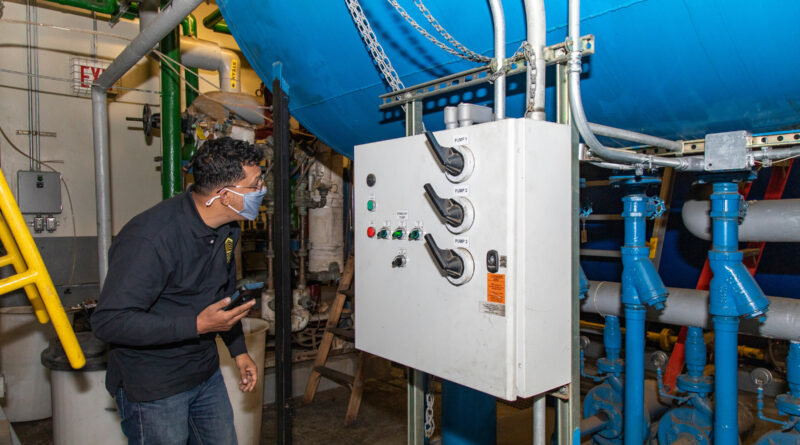Healthy Happenings
The Environmental Health and Safety (EHS) Department’s Spring/Summer Newsletter
Message from NYCHA’s Environmental Health and Safety Officer
Greetings, and welcome to the second edition of Healthy Happenings.
I hope that this edition finds you and your family well. The EHS team recently celebrated our third year as a department. While we take great pride in the work that has been done thus far, we look forward to expanding and strengthening our communication with our resident partners. Since the publication of our first newsletter in November 2021, we have had the pleasure of meeting with 19 resident associations on safety-related topics such as pest management, heating, and fire safety. These meetings have been very informative for the EHS team of specialists as well as the residents who participated. We plan to continue meeting with resident associations across the city.
The focus of this edition of Healthy Happenings is our Building Systems Safety Unit (BSSU). As required by NYCHA’s agreement with the federal government, the BSSU oversees three key areas of resident experience: heating, elevators, and fire safety. The ability to deliver heat when required, provide safe and reliable elevator service, and ensure that all fire protection systems are functioning as designed are top priorities for NYCHA. If these essentials are not delivered, our team investigates and provides corrective actions to make sure any issues are resolved.
Thank you for taking the time to read this publication. If you have any questions or would like additional information on any safety-related topic, please feel free to email us at ehs@nycha.nyc.gov.
Stay safe and have a great summer!
Patrick O’Hagan, Environmental Health and Safety Officer
Meet the Building Systems Safety Unit (BSSU)
The BSSU is responsible for overseeing activities that can potentially impact the health and safety of residents and staff, such as elevator safety, fire safety, and the safe delivery of heat to NYCHA residents. The unit ensures that vendors, contractors, and NYCHA personnel are in compliance with all applicable regulations. In addition, the BSSU investigates complaints from residents and employees regarding the abovementioned potential hazards. Continue reading to learn more about the teams within the BSSU.
Heating Oversight Team (HOT)
- Monitors NYCHA’s compliance with regulations and standards governing heating systems to ensure residents are provided with reliable heat and hot water services; investigates and analyzes the root cause of unplanned heating outages lasting more than 12 hours
- Inspects tanks and boiler rooms to ensure they meet NYCHA standards
- Inspects completed repair work and annual overhauls conducted by NYCHA’s Heating Management Services Department and provides recommendations on corrective actions
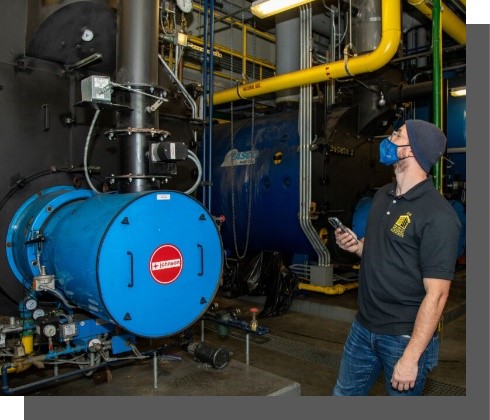
Fire Safety Oversight Team (FSOT)
The FSOT performs field oversight to ensure that the Authority complies with all applicable fire safety codes and helps staff identify and address any potential fire hazards.
- Conducts inspections to verify compliance with safety mandates
- Provides oversight inspections of fire suppression systems
- Investigates resident fire safety concerns that are submitted to NYCHA
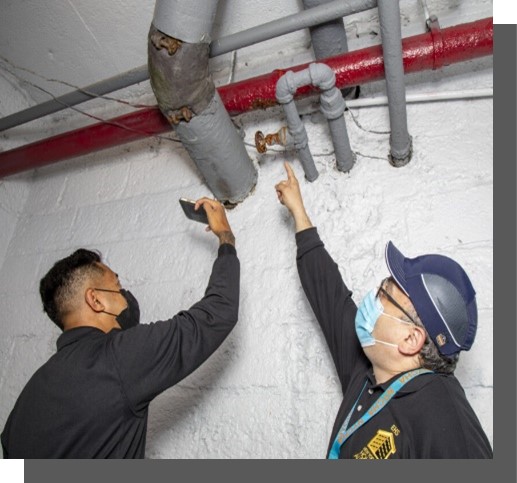
Elevator Oversight Team (EOT)
The EOT is responsible for providing oversight for elevator safety and ensuring that NYCHA staff and vendors follow regulations and standards concerning the maintenance, repair, and inspection of passenger elevators.
- When an elevator has an excessive number of unplanned outages in a 30-day period, the EOT conducts an analysis to determine the reason for the outages
- Based on the findings, the team provides recommendations for improvements to NYCHA’s Elevator Services and Repair Department to ensure reliable and safe elevator operations
- Provides on-site guidance to property management staff
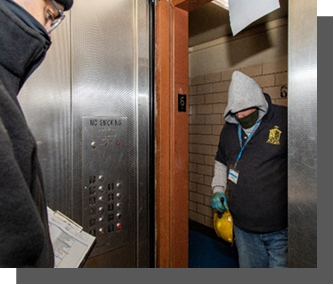
Tips for Elevator Safety
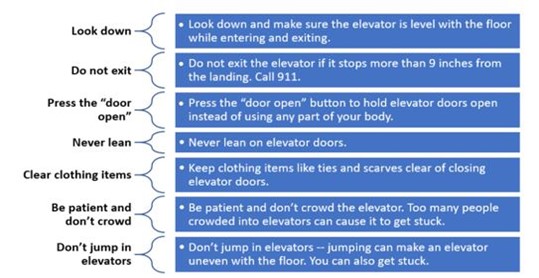
Fire Safety First; Fire Safety Always!
- KNOW YOUR EXITS: primary and secondary exits, stairways, and outside gathering areas.
- KEEP YOUR EXITS CLEAR AND DOORS WORKING: keep your path of egress, stairways, and outside fire escapes free of obstructions at all times.
- KNOW YOUR WAY OUT: review the fire safety plan on the inside of your apartment front door.
- TAKE CARE OF YOUR DETECTORS: never remove your smoke detector/carbon monoxide detector, and make sure to check the batteries regularly.
- NEVER LEAVE AN OPEN FLAME (like stoves or candles) unattended.
Sun Safety
Overexposure to ultraviolet (UV) radiation from the sun can result in a painful sunburn. It can also lead to more serious health problems, including skin cancer, premature aging of the skin, cataracts and other eye damage, and immune system suppression. Children are particularly at risk. To reduce the risk, please review the following information from the Environmental Protection Agency (EPA):
- Early detection of melanoma can save your life; a new or changing mole should be evaluated by a dermatologist.
- Sunburns significantly increase one’s lifetime risk of developing skin cancer, especially for children.
- UV radiation from tanning beds and the sun causes skin cancer and wrinkling.
- Apply sunscreen to all exposed skin 15 minutes before going outside. Sunscreen should have a Sun Protection Factor (SPF) of at least 15 and provide broad-spectrum protection from both ultraviolet A and ultraviolet B rays. Reapply every two hours, even on cloudy days.
- Wear protective clothing, such as a long-sleeved shirt, pants, a wide-brimmed hat, and sunglasses, when possible
- Seek shade when possible, and remember that the sun’s UV rays are strongest between 10 a.m. and 4 p.m.
- Water and sand reflect the damaging rays of the sun, which can increase your chance of sunburn.
- The UV Index provides important information to help you plan your outdoor activities in ways that prevent sun overexposure. The UV Index forecast is issued daily by the National Weather Service and EPA.
- Get vitamin D safely through a diet that includes vitamin supplements and vitamin D-rich foods.
Submit a Concern
EHS encourages residents to submit any safety concerns by calling the Customer Contact Center at 718-707-7771 (select menu option 7, then option 3) or by visiting on.nyc.gov/submit-concern.
EHS Informational Campaigns
February: Burn Awareness Week

